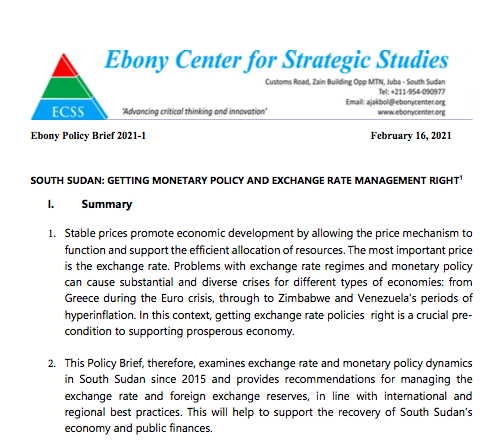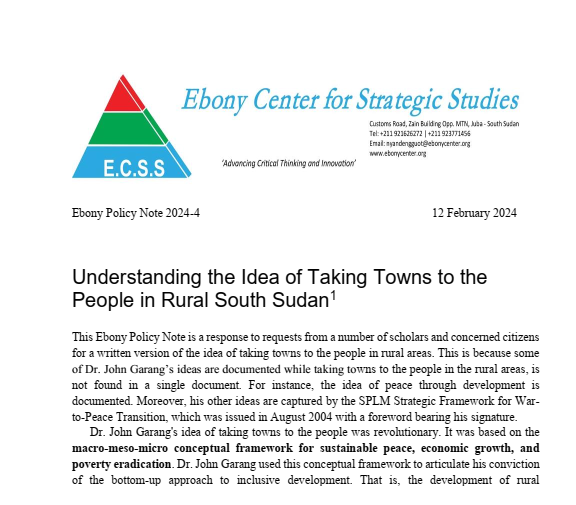
Ebony Policy Note: EPN 2024-4
12 February 2024
Understanding the Idea of Taking Towns to the People in Rural South Sudan
This Ebony Policy Note is a response to requests from a number of scholars and concerned citizens for a written version of the idea of taking towns to the people in rural areas. This is because some of Dr. John Garang’s ideas are documented while taking towns to the people in the rural areas, is not found in a single document. For instance, the idea of peace through development is documented. Moreover, his other ideas are captured by the SPLM Strategic Framework for Warto-Peace Transition, which was issued in August 2004 with a foreword bearing his signature.
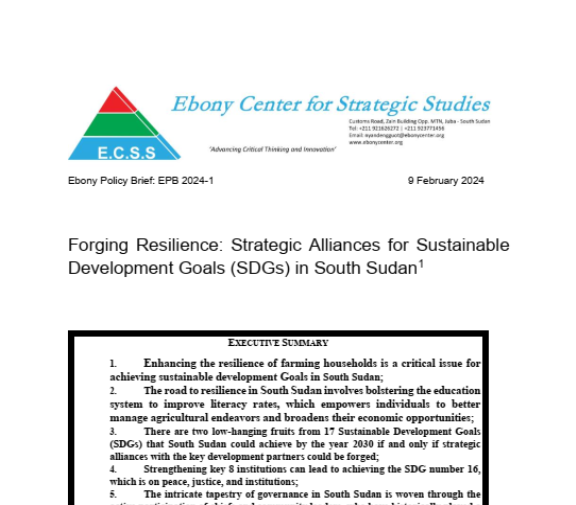
Ebony Policy Brief: EPB 2024-1
09 February 2024
Forging Resilience: Strategic Alliances for Sustainable Development Goals (SDGs) in South Sudan.
Understanding Resilience in the Context of South Sudan requires a multifaceted approach, considering the numerous challenges and potential levers for development that exist within the country. The United Nations (UN) system can play a significant role in supporting the Government of the Republic of South Sudan (GRSS) to effectively coordinate various activities and development assistance to the country.
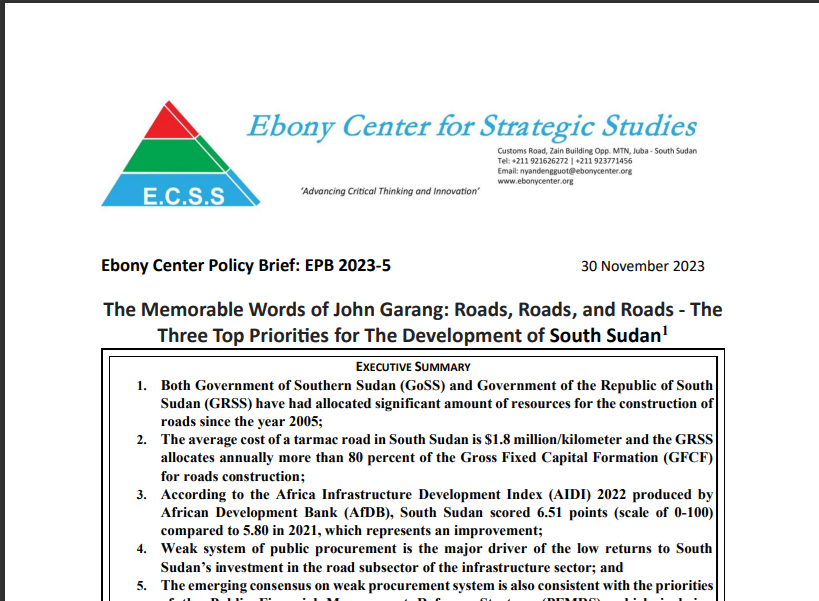
Ebony Policy Brief: EPB 2023-5
30 November 2023
The Memorable Words of John Garang: Roads, Roads, and Roads – The Three Top Priorities for The Development of South Sudan
The late Dr. John Garang de Mabior, the first Chairman of the Sudan People’s Liberation Movement (SPLM) was asked in April 2005 at the Oslo Donors’ Conference for the Sudan about what were his three top priorities? He responded unambiguously: roads, roads, and roads. His response was consistent with the SPLM top priorities for the Interim Period as expressed in the SPLM Strategic Framework for War-to-Peace Transition, issued in August 2004.
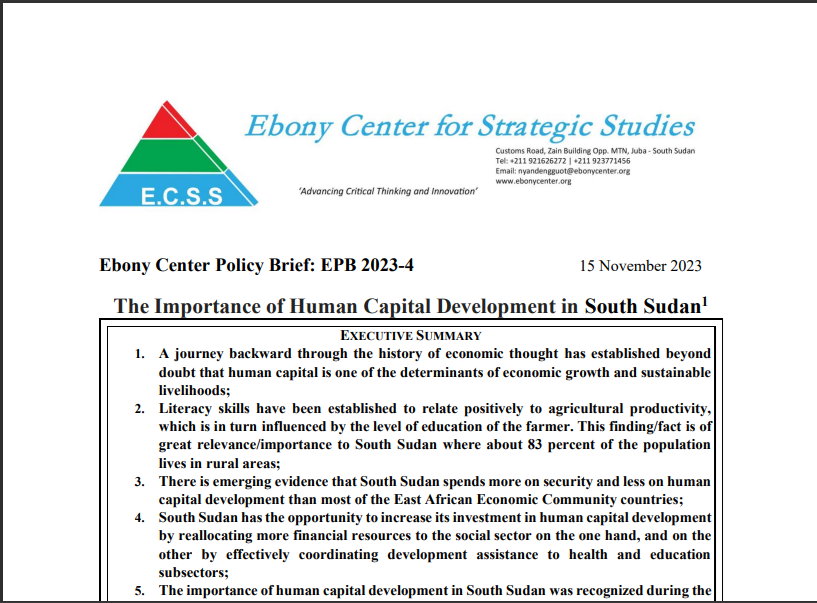
Ebony Policy Brief: EPB 2023-4
15 November 2023
The Importance of Human Capital Development in South Sudan
It is now established that human capital is one of the three proximate causes of economic
growth. The other two are physical capital and technology. Even these two are underpinned by
human capital in that, as stated by Kuznets2
: If technology is to be employed efficiently and widely, and, indeed, if its own progress is to be
stimulated by such use, institutional and ideological adjustments must be made to effect the proper use of innovations generated by the advancing stock of human knowledge.
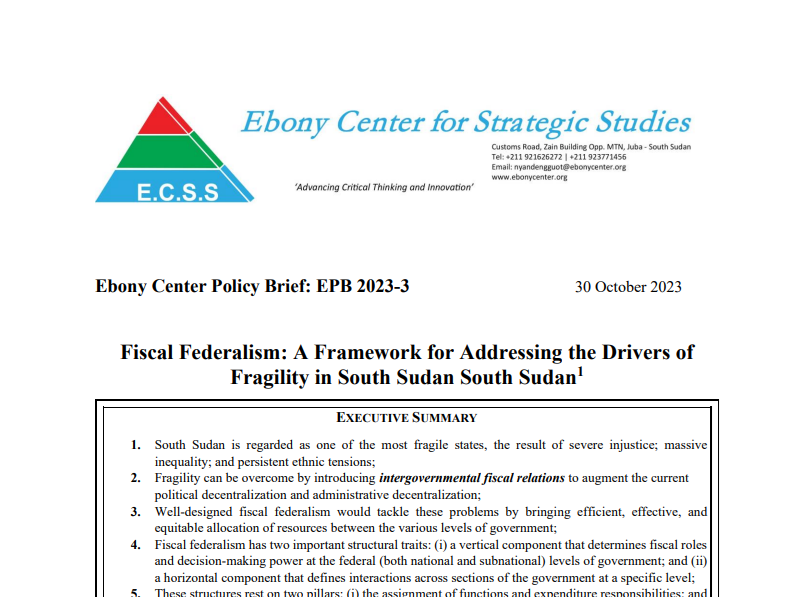
Ebony Policy Brief: EPB 2023-3
30 October 2023
Fiscal Federalism: A Framework for Addressing the Drivers of
Fragility in South Sudan South Sudan
This Policy Brief builds on the Development Policy Forum (DPF) discourse that was held
on Saturday 28 October 2023 at the World Bank’s Tukul in Juba. The topic of the discourse was on Fiscal Federalism: A Framework for Addressing the Drivers of Fragility in South Sudan. The discourse was organized with valuable financial and logistical support from the World Bank’s
Country Office for South Sudan.
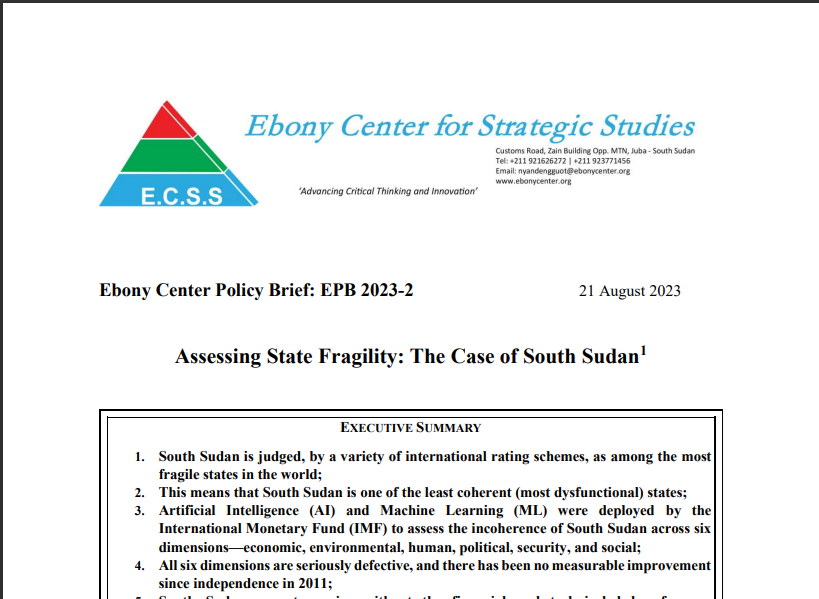
Ebony Policy Brief: EPB 2023-2
21 August 2023
Assessing State Fragility: The Case of South Sudan
A fragile state can be thought of as having the following properties: (1) lack of a shared national identity; (2) absence of a sense of government legitimacy; (3) lack of the capacity to govern; (4) little confidence in its own future; (5) an under-developed private sector; and (6) significant exposure to political and economic shocks.
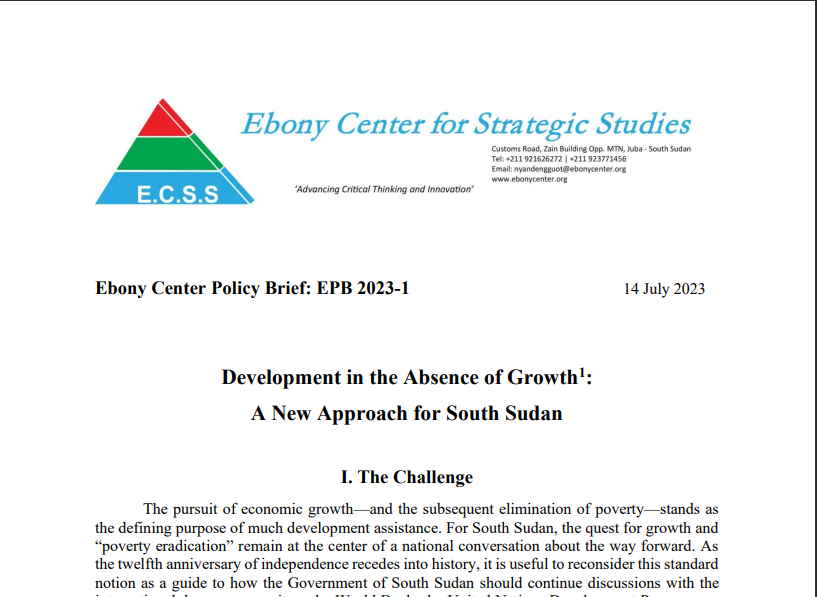
Ebony Policy Brief: EPB 2023-1
14 July 2023
Development in the Absence of Growth:
A New Approach for South Sudan
The general concept of Rural Development, leave alone the Integrated aspect, has deep and long history in South Sudan (formerly Sudan) as it goes back to the 1960s and 1970s, especially after Addis Ababa Peace Agreement in 1972 when agricultural production was directly linked to government activities and projects that co-opted communities’ involvement and participation into them.
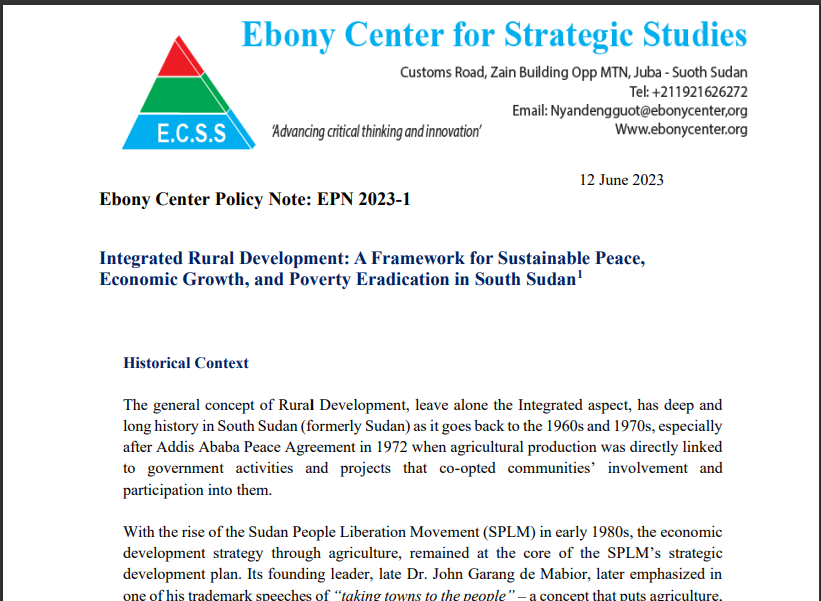
Ebony Policy Note: EPN 2023-1
12 June 2023
Integrated Rural Development: A Framework for Sustainable Peace,
Economic Growth, and Poverty Eradication in South Sudan
The pursuit of economic growth—and the subsequent elimination of poverty—stands as
the defining purpose of much development assistance. For South Sudan, the quest for growth and
“poverty eradication” remain at the center of a national conversation about the way forward.
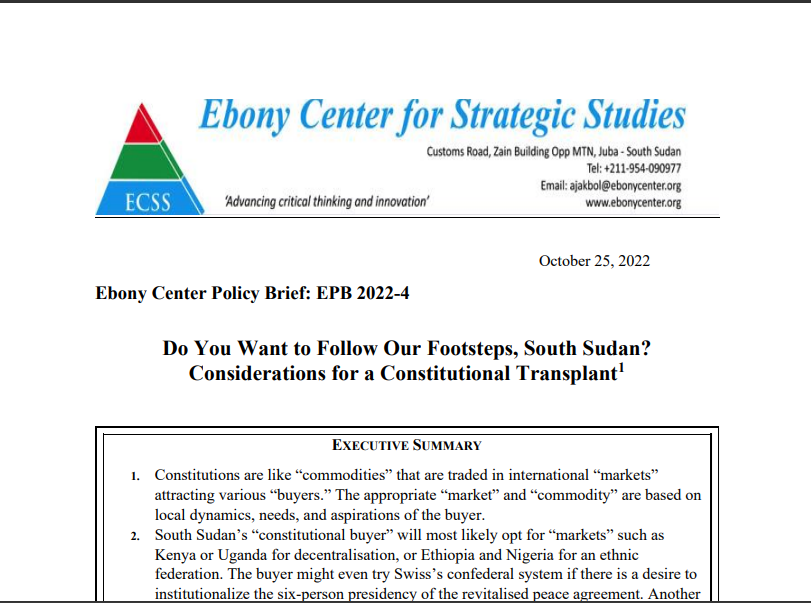
Ebony Policy Brief: EPB 2022-4
October 25, 2022
Do You Want to Follow Our Footsteps, South Sudan?
Considerations for a Constitutional Transplant
On May 10, 2022, the Ebony Center for Strategic Studies issued Ebony Policy Brief
2022-2 entitled Creating A Constitution for South Sudan. We acknowledged the important
insights of Dr. Joseph Geng Akech in the crafting of that document. Over the intervening six months, we at the Ebony Center have worried that serious interest in solving the enduring governance crisis in South Sudan has dissipated. As so often happens, there is a burst of discussion and debate on a specific issue, and then the subject is forgotten.
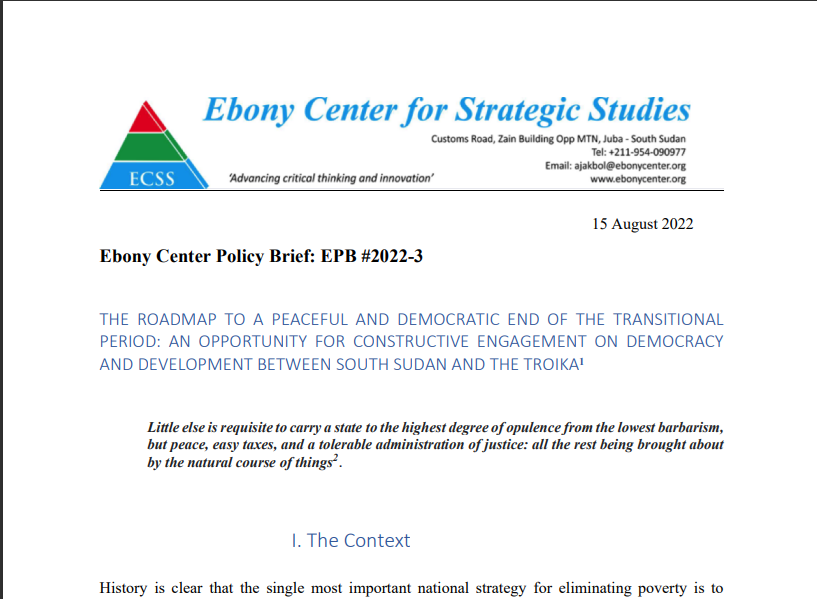
Ebony Policy Brief: EPB 2022-3
August 15, 2022
THE ROADMAP TO A PEACEFUL AND DEMOCRATIC END OF THE TRANSITIONAL
PERIOD: AN OPPORTUNITY FOR CONSTRUCTIVE ENGAGEMENT ON DEMOCRACY
AND DEVELOPMENT BETWEEN SOUTH SUDAN AND THE TROIKA
History is clear that the single most important national strategy for eliminating poverty is to
empower, through “tolerable administration of justice,” provinces(counties) and regions(states)
to unleash individual initiative at the local level.
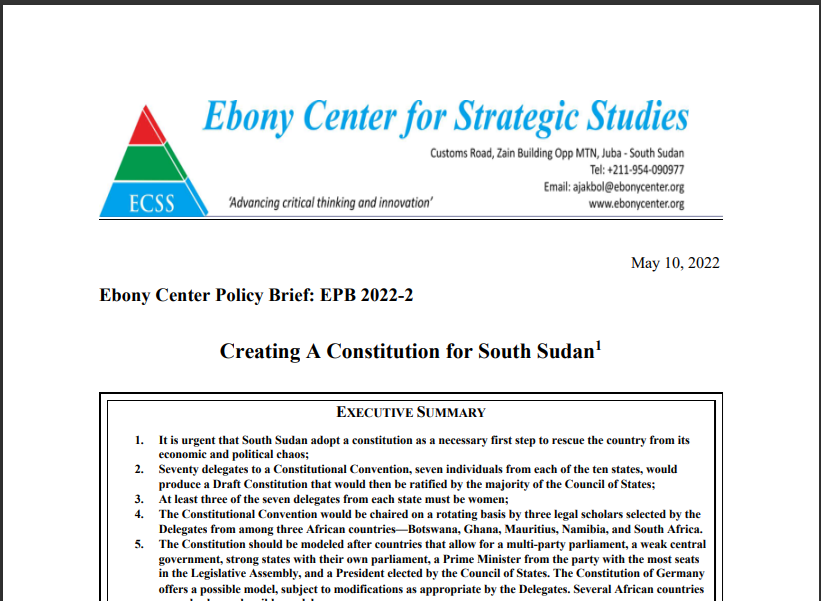
Ebony Policy Brief: EPB 2022-2
May 10, 2022
Creating A Constitution for South Sudan
A constitution represents the fundamental aspirations and foundational commitments
among members of a political community—a nation-state. A constitution says: this is how we do
things here. Of equal importance, a constitution clarifies and documents the moral and legal
commitments of a people: this is what we stand for, and this is how we propose to get along.
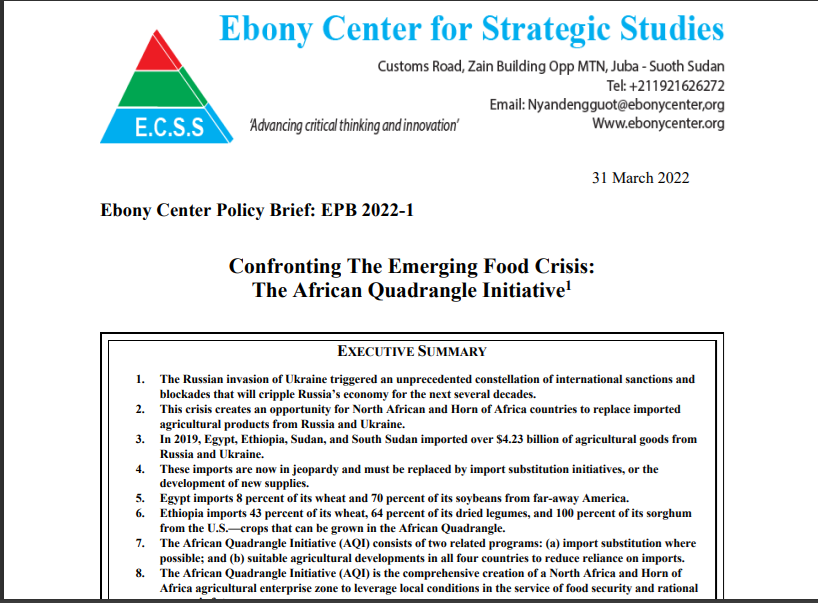
Ebony Policy Brief: EPB 2022-1
March 31, 2022
Confronting The Emerging Food Crisis:
The African Quadrangle Initiative
In 2019, Egypt imported 70 percent of its wheat from Russia and Ukraine—a foreign
currency drain of approximately $3.27 billion. In addition, Egypt spent approximately $740
million to import corn and soybeans from Ukraine. Sudan imported 46 percent of its wheat from
Russia at a foreign exchange cost of approximately $204 million. Ethiopia acquired 9 percent of
its wheat imports from Russia at a foreign exchange cost of approximately $13.5 million.
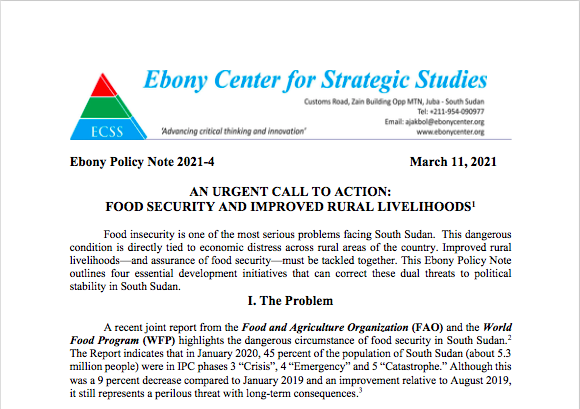
Food insecurity is one of the most serious problems facing South Sudan. This dangerous condition is directly tied to economic distress across rural areas of the country. Improved rural livelihoods—and assurance of food security—must be tackled together. This Ebony Policy Note outlines four essential development initiatives that can correct these dual threats to political stability in South Sudan.
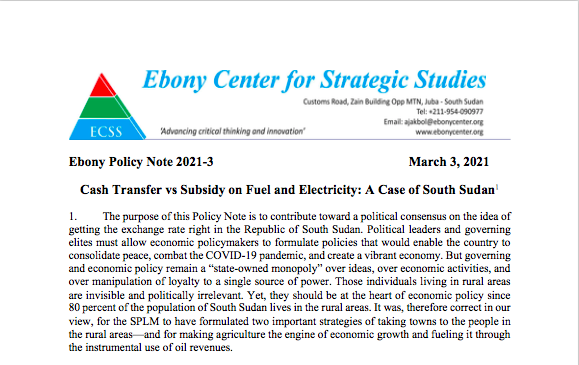
The purpose of this Policy Note is to contribute toward a political consensus on the idea of getting the exchange rate right in the Republic of South Sudan. Political leaders and governing elites must allow economic policymakers to formulate policies that would enable the country to consolidate peace, combat the COVID-19 pandemic, and create a vibrant economy. But governing and economic policy remain a “state-owned monopoly” over ideas, over economic activities, and over manipulation of loyalty to a single source of power….
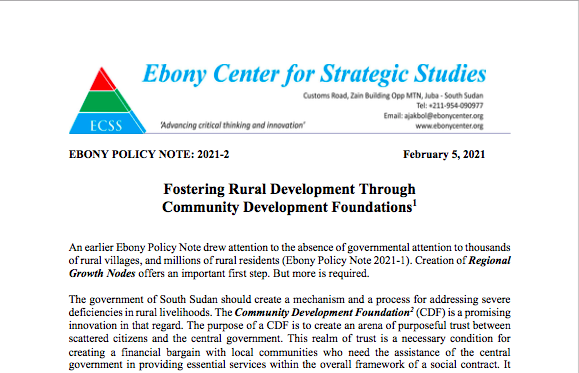
An earlier Ebony Policy Note drew attention to the absence of governmental attention to thousands of rural villages, and millions of rural residents (Ebony Policy Note 2021-1). Creation of Regional Growth Nodes offers an important first step. But more is required.
The government of South Sudan should create a mechanism and a process for addressing severe deficiencies in rural livelihoods. The Community Development Foundation2 (CDF) is a promising innovation in that regard. The purpose of a CDF is to create an arena of purposeful trust between scattered citizens and the central government. This realm of trust is a necessary condition for creating a financial bargain with local communities who need the assistance of the central government in providing essential services within the overall framework of a social contract.
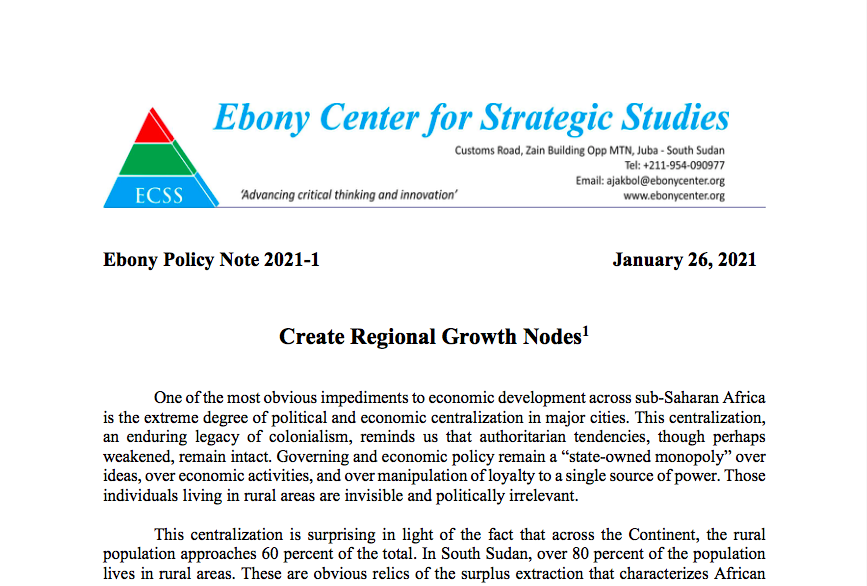
On July 9, 2011, South Sudan emerged from its long civil conflict with Sudan and became an independent nation. Now, a decade later, it is still not a state.
In this Policy Brief, we explain why South Sudan is not yet a state. More importantly, we explain why peace is impossible until the Government of South Sudan (GoSS) is able to provide promising livelihoods to its people. Only then will the severe economic paralysis give way to a promising future for all its citizens. While constant demands for peace are understandable, that same commitment and energy should instead be directed toward state creation. Peace is impossible if plausible livelihoods are impossible.
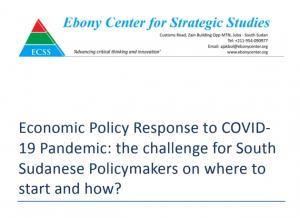
Economic Policy Response to COVID- 19 Pandemic: the challenge for South Sudanese Policymakers on where to start and how?
Reflections of a concerned senior citizen presented to the Development Policy Forum (DPF) Digital Platform By Lual A Deng Juba, Republic of South Sudan April 2020.
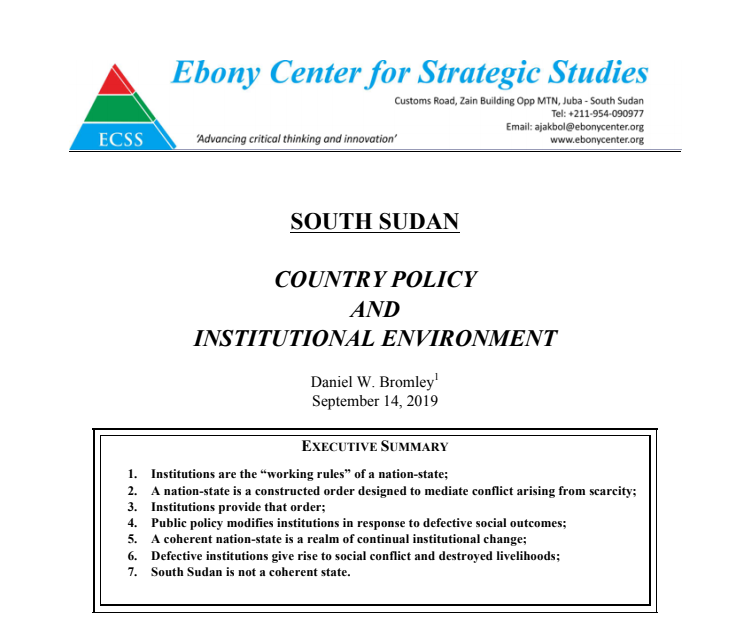
Country Policy and Instituational Environment
South Sudan became an independent nation on July 9, 2011. Eight years later it is still not a coherent state. Coherent states require two essential attributes—one of which is structural in nature, the second of which concerns processes. When these two necessary conditions are absent, the economy cannot perform its necessary functions, and civil conflict is inevitable. These necessary structural and procedural parameters are institutions.
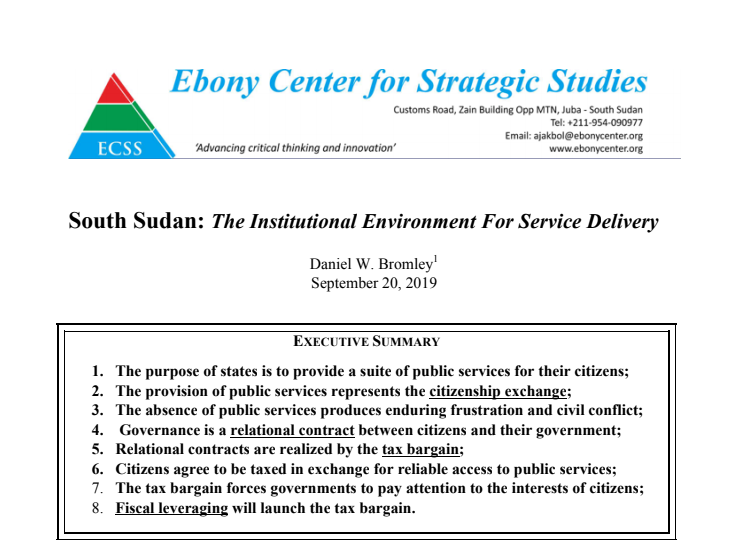
South Sudan: The Institutional Environment For Service Delivery
South Sudan became an independent nation on July 9, 2011. Eight years later it is still not a coherent state. Coherent states require two essential attributes—one of which is structural in nature, the second of which concerns processes. When these two necessary conditions are absent, the economy cannot perform its necessary functions, and civil conflict is inevitable. These necessary structural and procedural parameters are institutions.
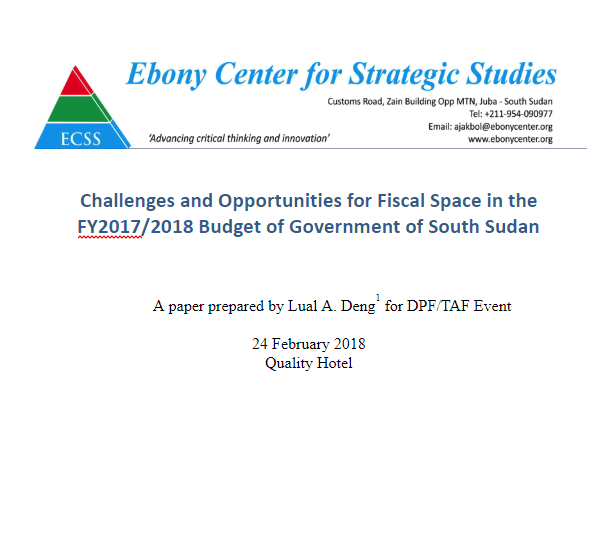
Challenges and Opportunities for Fiscal Space in the FY2017/2018 Budget of Government of South Sudan
The fundamental challenge for fiscal space in the FY2017/2018 budget of the Transitional Government of National Unity (TGoNU) of the Republic of South Sudan is the inherent indiscipline in the management of approved budgets. One of the root causes of this indiscipline is the lack of effective oversight from the legislative branch of government. The paper reviews the government’s share of oil revenues during the first half of FY2017/2018 to show that there was a fiscal space during this period emanating from improved oil production and rising oil prices than the budgetary benchmarks. However, indiscipline in budgetary execution has not allowed TGoNU to make use of this opportunity. The paper, therefore, calls for enhanced oversight of the budgetary process through the establishment of a transparency and accountability forum (TAF) that will include all the stakeholders.
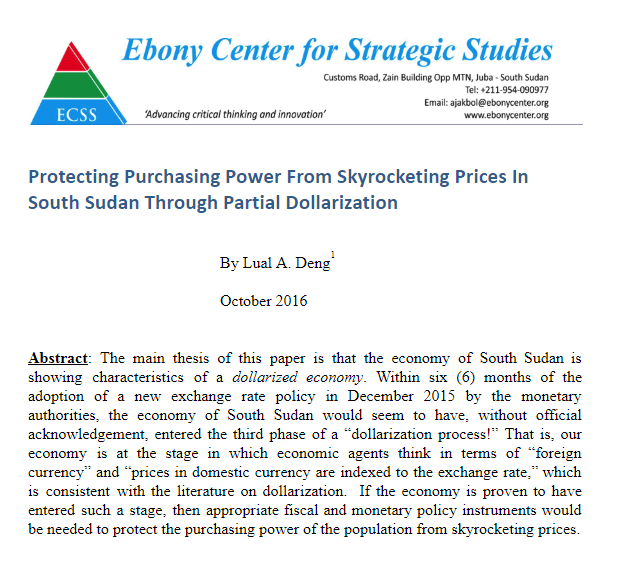
Protecting Purchasing Power From Skyrocketing Prices In South Sudan Through Partial Dollarization
The main thesis of this paper is that the economy of South Sudan is showing characteristics of a dollarized economy. Within six (6) months of the adoption of a new exchange rate policy in December 2015 by the monetary authorities, the economy of South Sudan would seem to have, without official acknowledgement, entered the third phase of a “dollarization process!” That is, our economy is at the stage in which economic agents think in terms of “foreign currency” and “prices in domestic currency are indexed to the exchange rate,” which is consistent with the literature on dollarization. If the economy is proven to have entered such a stage, then appropriate fiscal and monetary policy instruments would be needed to protect the purchasing power of the population from skyrocketing prices.
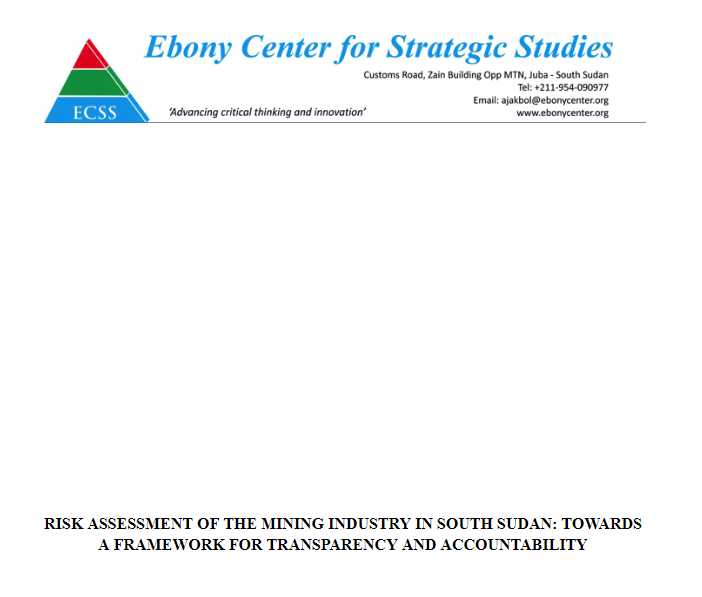
Risk Assessment of the Mining Industry In South Sudan: Towards a Framework For Transparency and Accountability
This study, “Risk Assessment of the Mining Industry in South Sudan: Towards a Framework for Transparency and Accountability”, was commissioned by Ebony Center for Strategic Studies. It commenced in the second week of May 2019 and was completed by the first week of June. Mr. Azaria Gillo, a geologist working in the Ministry of Mining was my research assistant and his contribution led to the success of the research work. I thank him very much.

Weekly Monitoring of the Foreign Exchange Rate Market in Juba
Summary of this week's Monitoring of the Foreign Exchange Rate Market in Juba.

CALL FOR RESEARCH PROPOSAL
CALL FOR RESEARCH PROPOSALS ON: The Impact of Charcoal Production on The Ecology and Economy of South Sudan
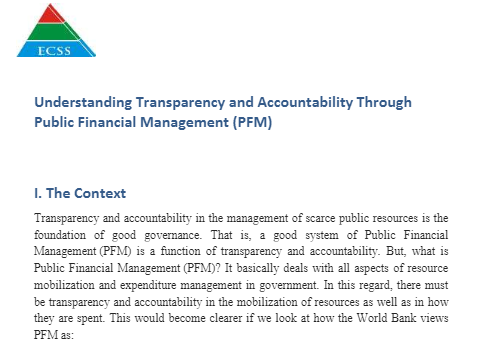
Understanding Transparency and Accountability Through Public Financial Management
Understanding Transparency and Accountability Through Public Financial Management

2nd TAF Article IV Presentation to DPF - June 9, 2016
2nd TAF Article IV Presentation to DPF - June 9, 2016
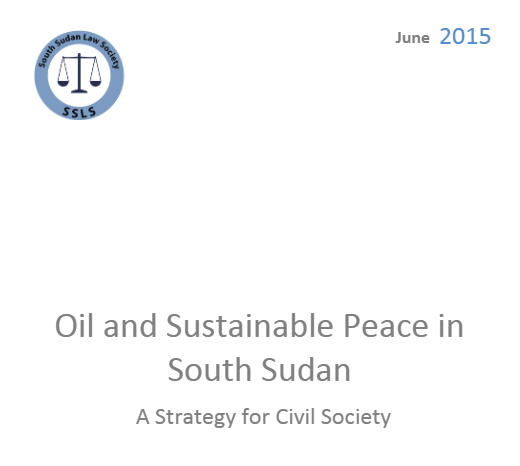
Oil and Sustainable Peace in South Sudan
June 2015 - A Stretgy for Civil Society

Policy Strategy Paper on Regional Protection Force Under UNMISS-Plus ’ Mandate in the Republic of South Sudan
South Sudan: The Imperative of Proactive and Smart Diplomacy for Constructive Engagement with the Region and World at Large To Implement the ARCISS Effectively Presenters: DPF’s Foreign Policy Team James Okuk, Jacqueline George, Keji Roman, Augustino Ting Mayai, Mabior Philip Mach, Philip Thon Aleu.
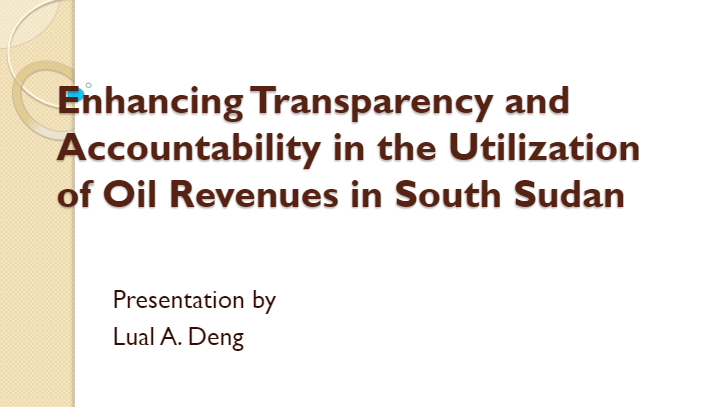
Fifth TAF Event Enhancing Transparency and Accountability in the Utilization of Oil Revenues
Why Transparency & Accountability? To prevent the occurrence of the resource curse in South Sudan! But, has it not already occurred? Not yet, though there are symptoms of the resource curse.Hence, The central premise of my presentation is that South Sudan has the opportunity of turning the “resource curse” into a “resource blessing” through enlarging the number of people who benefit directly from oil revenues.
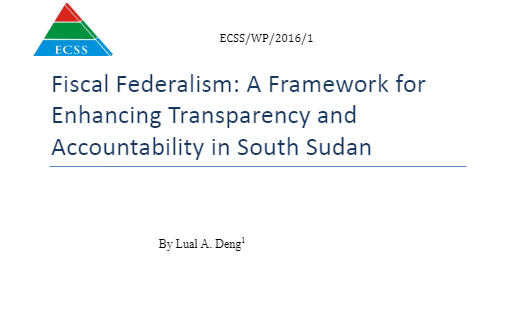
Fiscal Federalism: A Framework for Enhancing Transparency and Accountability in South Sudan
South Sudan is classified as one of the fragile states whose fragility is driven by three key drivers: injustice; inequality; and ethnic tensions. In this regard, the central premise of this paper is that inter-governmental fiscal relations, if well designed, would be the foundation for efficient, effective, and equitable allocation of resources, which would in turn tackle the three drivers of fragility.
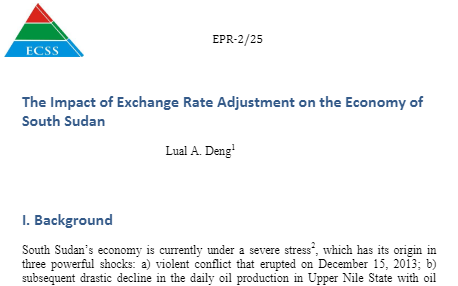
The Impact of Exchange Rate Adjustment on the Economy of South Sudan
South Sudan’s economy is currently under a severe stress, which has its origin in three powerful shocks: a) violent conflict that erupted on December 15, 2013; b) subsequent drastic decline in the daily oil production in Upper Nile State with oil fields in the Unity State completely shutdown; and c) the drop in oil prices in the international market for crude oil by about 63% in September 2015 compared to that of June 2014.

Addressing the Urgent Fiscal Crisis in South Sudan
South Sudan still suffers from fiscal dysfunction and flawed management of scarce financial resources; Government agencies continue to disregard the legal Appropriations Acts by overspending or diverting funds to items that fall outside of approved budgets; Tax revenue in the Q3 of 2015 rose less than budget projections; Serious distortions persist in all markets—including currency; The economy must be diversified to escape the dangerous reliance on oil; Units of government should face future cuts to avoid overspending; Tax collections should be improved through administrative reforms; and Deficit financing should be eliminated or brought under control in line with the Bank of South Sudan Act 2011.
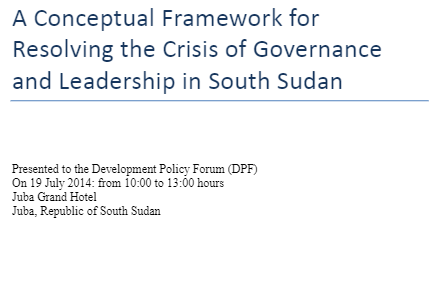
A Conceptual Framework for Resolving the Crisis of Governance and Leadership in South Sudan
This ‘Conceptual Framework for Resolving the Crisis of Governance and Leadership in South Sudan‘ states the problem as political dysfunctionality. The paper uses two analytical tools to articulate the nature of the crisis: a 3-circle Venn diagram and a fragility trap. For nine (9) years, the SPLM leaders now in conflict did nothing to improve the plight of their citizens. In this regard, a transitional government of national unity (TGNU) led by the same actors will ensure that South Sudan remains in the vicious cycle of fragility for years to come. Instead, what is needed is an Interim Government of South Sudan (IGSS) that is guided by an overarching vision of sustained peace, economic growth, and poverty eradication.
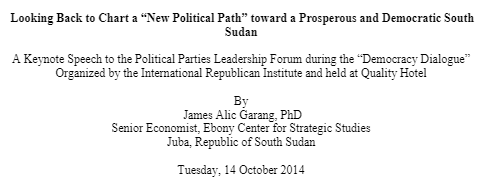
Looking Back to Chart a “New Political Path” toward a Prosperous and Democratic South Sudan
A Keynote Speech to the Political Parties Leadership Forum during the “Democracy Dialogue” Organized by the International Republican Institute and held at Quality Hotel.
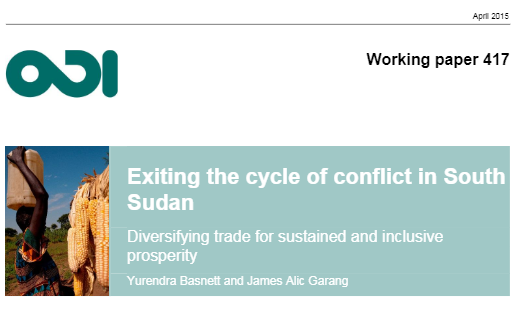
Exiting the cycle of conflict in South Sudan
The violence in South Sudan in 2013 punctured the euphoria surrounding the ending of 21 years of conflict (1983–2005) and the emergence of South Sudan as an independent nation in 2011. The economic factors contributing to the political instability have been apparent since independence, yet they have not been addressed with any urgency. On the one hand, the traditional sources of livelihoods such as farming and cattle-rearing remain devastated. On the other, the flooding of the economy with revenue from oil exports has skewed incentives towards capturing rents. Falling oil reserves, as well as price volatility, are adversely affecting South Sudan’s economy. Arresting the deteriorating situation will require investing oil revenues and aid resources in building capacity to diversify production and trade.
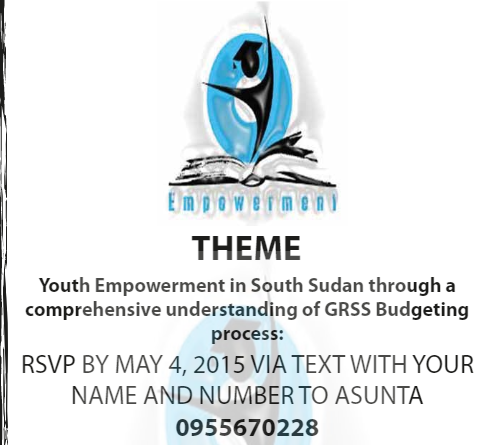
Youth Empowerment Workshop
Youth Empowerment in South Sudan through a comprehensive understanding of GRSS Budgeting process Organized by Ebony Center for Strategic Studies (ECSS).

Ebony Center Policy Brief: EPB 2022-1
Confronting The Emerging Food Crisis: The African Quadrangle Initiative
In 2019, Egypt imported 70 percent of its wheat from Russia and Ukraine—a foreign currency drain of approximately $3.27 billion. In addition, Egypt spent approximately $740 million to import corn and soybeans from Ukraine. Sudan imported 46 percent of its wheat from Russia at a foreign exchange cost of approximately $204 million. Ethiopia acquired 9 percent of its wheat imports from Russia at a foreign exchange cost of approximately $13.5 million.
